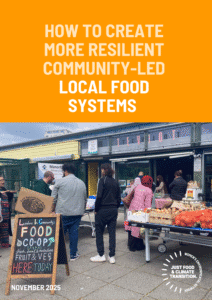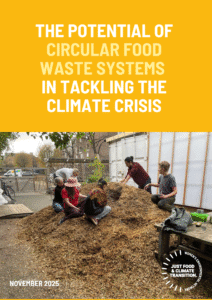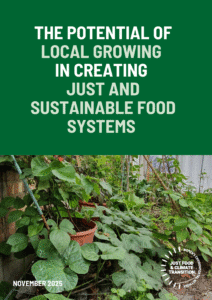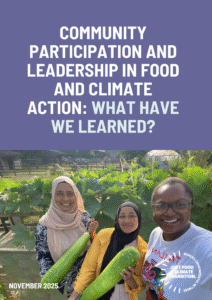How to create more resilient community-led local food systems
In this report we explore how partners in the Just Food and Climate Transition Programme (Just FACT) are experimenting with alternative, not-for-profit models that are less reliant on charitable grants and tackle key issues in the local food system, from improving access to affordable, nutritious, sustainable food to reducing waste.
We share learning from food cooperatives, urban farms, regenerative producers and circular food waste systems, highlighting what supports their sustainability, and the barriers they face. The report also outlines the policy and structural changes needed to help these models thrive.
We hope it can be a useful resource for people who are interested in exploring how to create resilient, socially just, sustainable alternatives to the dominant food systems that shape how most growers and retailers operate in the UK.
DOWNLOAD HERE
Summary of key findings
Rethinking community and business partnerships within supply chains
- Local buying groups are an effective way for people to access affordable food. Savings are significant at around £2080 per household each year
- When it’s affordable, people on low incomes will often choose organic
- Community-focused suppliers keep the price of organic produce down, with businesses like Folx Farm and Better Food Shed having positive social change as their top priority rather than profit
- Building connections between residents, workers and farmers helps residents overcome wariness about organic food and confusion over labelling
- Delivering ‘not for profit’ food production can be made possible by established commercial relationships. For example, donations from restaurants and food businesses at Folx Farm are used to subsidise costs.
Centring marginalised groups in production and sale of fruit and vegetables
- Hiring food growers from local communities builds trust and boosts sales. Flexible jobs also meant successful recruitment from underrepresented communities
- There is high demand for culturally appropriate food, with supply of Bangladeshi vegetables increasing market sales by £2,000 for Stepney City Farm
- Having a diversity of income streams can create stability
Technological innovation around closed loop systems
- Micro anaerobic digestion and composting infrastructure needs to scale up in order to play a more significant role in processing local food waste and growing food
- Scaling up closed loop systems in dense urban areas is a challenge. For example, flat rooftops are good candidate sites but require more planning, design, and structural engineering input
- There is a need for more robust economic models to support technological innovation around food waste
Summary of recommendations
- Local authorities and housing associations need to offer long leases and affordable rates to organisations pioneering alternative, not-for-profit food system models.
- There needs to be a more supportive economic environment for local growers and producers, to cross-subsidise community growing
- Local and national policies need to be adapted to support local food enterprises
- Charitable and local authority funding remains essential for piloting projects until they reach a point of sustainability
Contents
- Introduction
- Context
- Learning from alternative models
- Neighbourhood Food Cooperatives
- Sustainable Urban Food Growing at Stepney City Farm
- Folx Farm’s Food Access Fund
- Piloting scalable closed loop systems with R-Urban Poplar and MAD LEAP
- Birds eye view of an alternative neighbourhood food economy
- What needs to change to support these models




